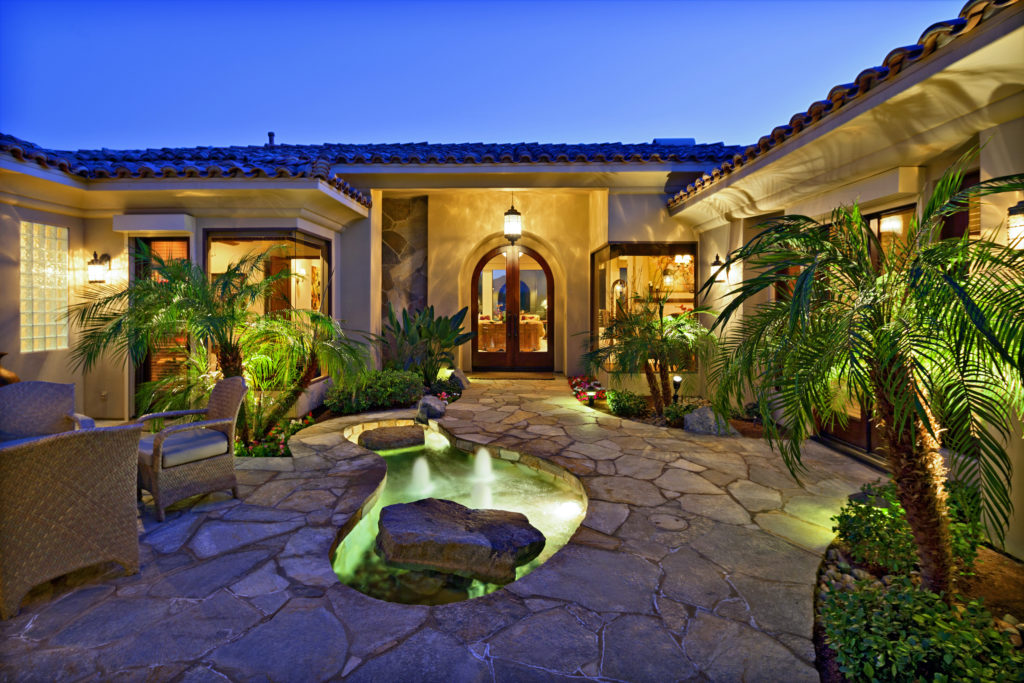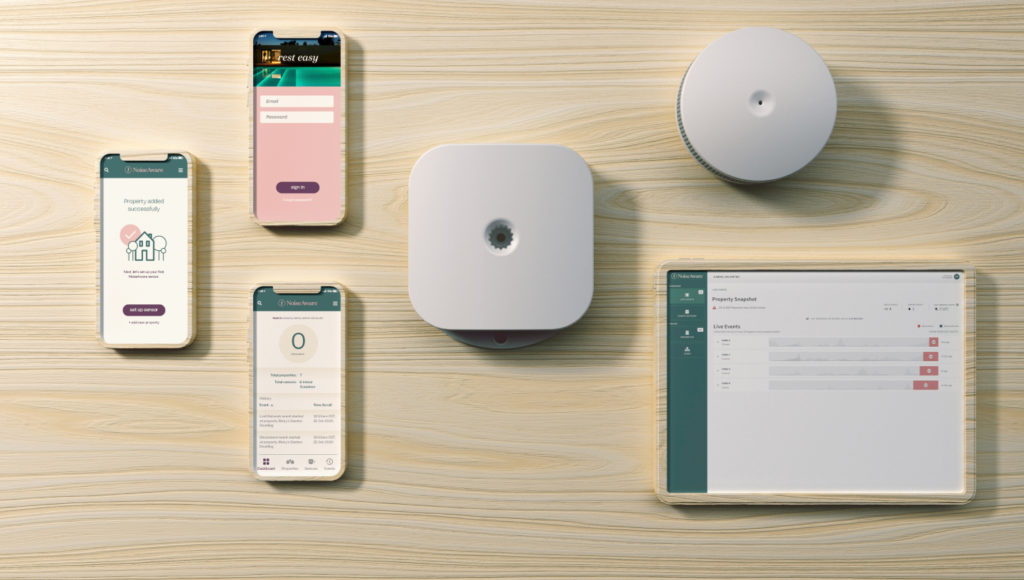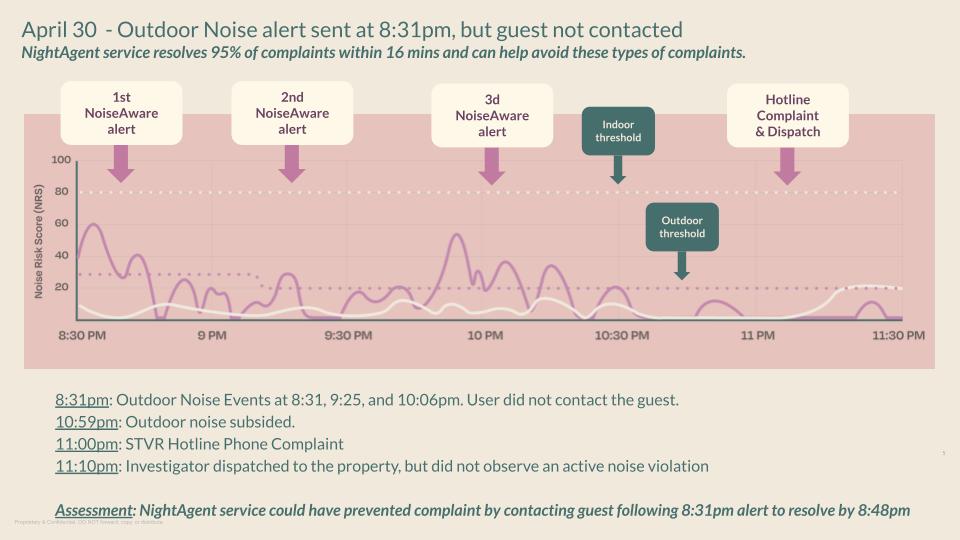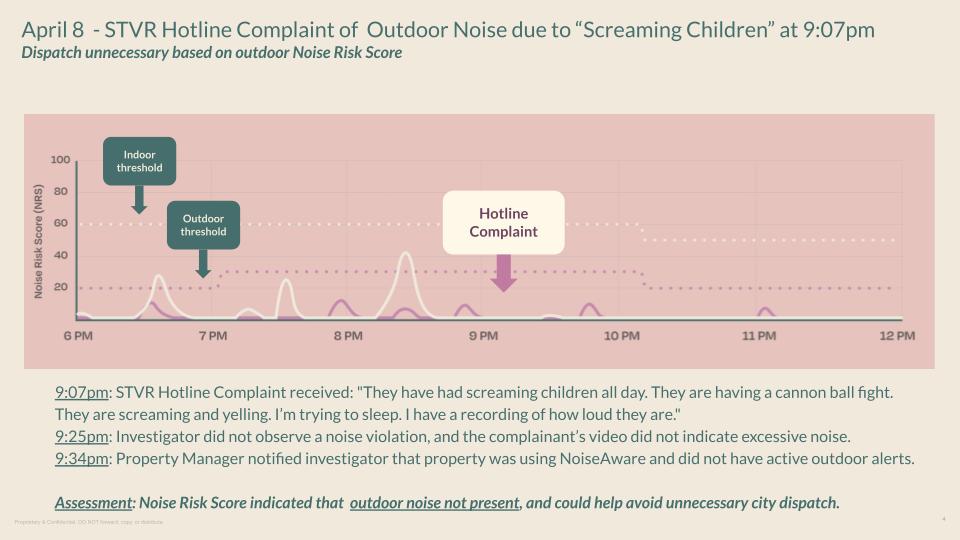
The 25-property La Quinta pilot program also saw the frequency of outdoor noise problems slashed by 44 percent in a city where outdoor activity is a huge draw for guests.
The Challenge
With its 25 golf courses, surrounding views of the picturesque Santa Rosa mountains, and average annual daytime temp of 75 degrees, La Quinta is, unsurprisingly, a wildly popular Southern California tourist destination. It’s also not surprising that the Coachella Valley vacation hotspot has experienced its share of tourism pains, as local residents have raised concerns about parking, parties, trash and noise associated with short-term vacation rentals.
While the city requires permits for short-term rentals, many residents felt these were being handed out too broadly, without enough oversight or consequences for ordinance violations. Meanwhile, vacation-rental owners and investors remained intent on protecting their right to offer unique private accommodations to visitors, and generate rental income responsibly.
A City Takes Noise Complaints Seriously
The situation came to a head in late 2020, when the La Quinta city council approved changes to its short-term-vacation-rental ordinance, including stiffer fines, a shortened time frame in which a property owner or manager has to respond to a complaint, and the presence of a local contact available 24 hours a day.
But these fixes didn’t calm residents’ concerns entirely. Noise continued to be a major problem, prompting vocal complaints during special city council meetings in January and February of this year, along with hours of public comments. Out of this period of STR reckoning, the city council realized it had to take stronger action and demonstrate real investment in solving the noise problem. That’s when NoiseAware entered the picture.
The Solution
Familiar with NoiseAware from its use in private event venues managed by the city, the La Quinta city council contacted the privacy-safe-noise-monitoring company in March. Council representatives worked with the NoiseAware team to create a pilot program designed to identify a practical solution to vacation-rental noise—especially outdoor noise associated with the al fresco parties and poolside gatherings so common to the desert destination.

The 25 properties selected to participate in the program received NoiseAware indoor and outdoor sensors that property managers could monitor through a simple mobile app. In some cases, the manager would notify guests asking them to lower their volume upon receiving an alert through the system. In other cases, the manager would intentionally not contact the guest, to determine how the unaddressed noise problem would play out: Would neighbors complain? If so, when? And what measures would the city need to take to deal with the problem?
The Results
After 90 days, the council reviewed the results of the La Quinta pilot program, and the data was decisive: Out of 294 excessive outdoor noise events and 64 excessive indoor noise events detected by NoiseAware sensors, the average time to complete stoppage of noise was 18 minutes. More than 70 percent of noise events lasted less than 10 minutes.
While the city had not previously measured the duration of noise events, it was able to determine that NoiseAware cut this time significantly. And that having NoiseAware’s AutoResolve feature, which directly messages guests without manager intervention when a nighttime noise event is detected, could cut that time even further.
NoiseAware Stops Noise Before It Becomes A Problem
In one test case, an alert was sent to the property manager when an outdoor noise event was detected at 8:31 p.m, but the manager did not contact the guest. A second noise alert was sent at 9:25, and a third at 10:06, indicating loud, ongoing outdoor noise. At 11 p.m. the noise finally subsided, but just then, a neighbor called the city’s STVR hotline to complain, prompting a visit from police to the property.

The takeaway: If the property had been equipped with NoiseAware’s late-night-noise-mitigation feature, it could have stopped the noise hours earlier, preventing a neighbor complaint and an expensive investigator dispatch to the property.
NoiseAware Data Debunks False Noise Complaints
Results from the La Quinta pilot program also showed NoiseAware to be effective at combating false or exaggerated noise complaints—an all too common occurrence in cities where vacation rentals are prevalent. In one instance, the city’s STVR complaint hotline received a call from a resident complaining about children “screaming and yelling all day” by the pool at a neighboring STVR, preventing her from being able to sleep. But the outdoor NoiseAware sensor at the property registered no excessive noise alert—a finding an investigator dispatched to the property, as part of the test, confirmed.

Another reassuring finding for property managers and the city council? The fact that the property’s indoor noise fluctuated considerably while outdoor noise barely blipped means that NoiseAware is effective at pinpointing noise that is likely to disturb neighbors, while allowing guests to laugh, talk, listen to music and enjoy themselves without fear of constant alerts.
Based on the strong results from Phase 1 of the pilot program, the City of La Quinta is currently developing Phase II, scheduled to launch in 2022, to understand how best to implement noise measurement into their permitting and enforcement process.